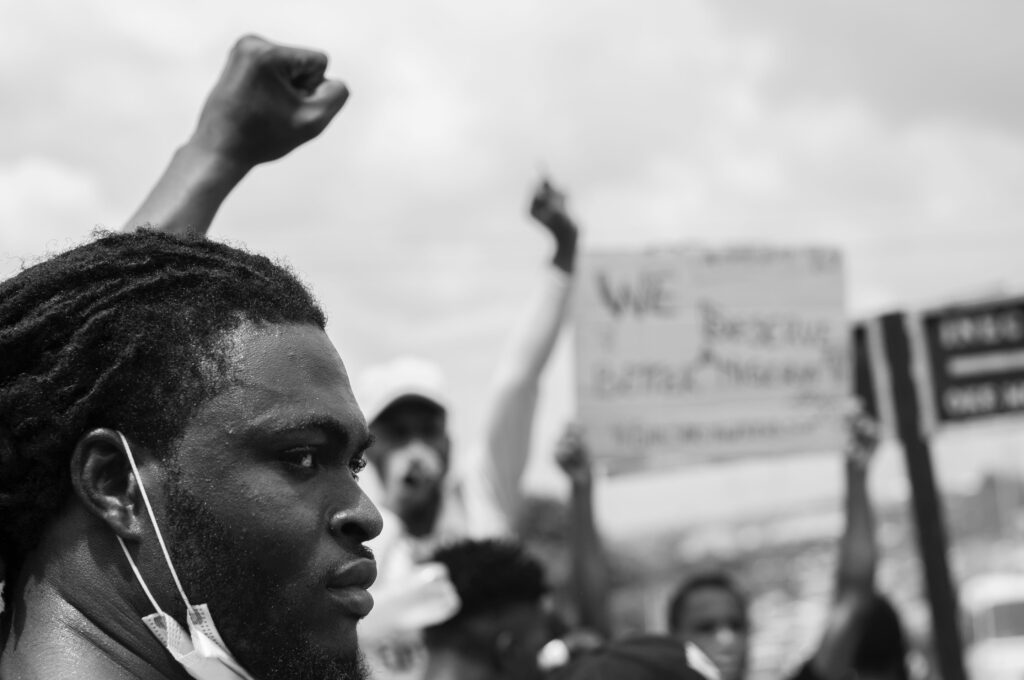“You OK, Bro?”: Does anyone really care about African-American boys and men?
Dr. Salvatore J. Giorgianni, Jr. PharmD. and Dr. Jean Bonhomme, MD MPH. address the ongoing issue of survival and health outcomes for Black males in the United States.
Over two and a half years ago, in the article “African-American Boys and Men in America Are Killing Themselves and No One Seems to Care,” I wrote about the national disgrace that is the heavier toll of suicide facing African-American boys and men. I said that in minority communities, people often misunderstand what a mental health condition is, and therefore, discussing the subject is uncommon. A lack of understanding leads many to believe that a mental health condition is a personal weakness or a form of punishment. African-Americans are also more likely to be exposed to factors that increase the risk for developing a mental health condition, such as discrimination, social isolation, homelessness, and exposure to violence.

What has changed—for better and for worse—since then? Do African-American men and boys continue to have a higher death rate from suicide and violence than others? Is the male suicide rate in the United States still far higher than women? Is suicide still a leading cause of death for minority males? Are African-Americans still more likely to experience serious mental health problems than the general population? Sadly, the answer to all of these questions remains yes.
What has gotten worse? As I’ve said previously, African-American youth who are exposed to violence have a 25% higher risk of developing PTSD than non-Black youth. Violent crime rates in US cities have only increased since 2019.2 This is especially true amongst young African-American men. These two facts seem inextricably tied together: violence leads to PTSD; PTSD leads to violence, over and over again.

Minority access to mental health-related diagnoses and care is impeded by barriers and challenges that are also experienced by minorities who need addiction and recovery support and resources. There also seems a strong correlation between mental health issues and overdose rates. A recent JAMA study suggests that during the COVID epidemic, specifically from January 2019 through mid-2020, opioid overdoses decreased 24% among whites in Philadelphia. Conversely, opioid overdoses actually increased amongst Black Philadelphians by over 50%.3 According to the U. S. Health and Human Services Office of Minority Health, only one third of Black adults diagnosed with mental illness receives treatment. According to the American Psychiatric Association’s “Mental Health Facts for African-Americans” guide, Black adults are less likely to be included in research and receive quality care, while being more likely to use an emergency room as primary care.
I recently spoke with Dr. Jean Bonhomme, founder of the National Black Men’s Health Network, who relayed to me some other startling recent statistics. In 2020, African-Americans made up about 13.5% of the U.S. population, while they also made up over 55% of homicide victims, with a more than a 65% increase in homicides relative to 2019. Other stark figures that Dr. Bonhomme shared were from a recent CDC study. 5
In the same period—2019 through 2020—drug overdose death rates for non-Hispanic Black persons increased by 44%, while for non-Hispanic American Indian or Alaska Native (AI/AN) persons the drug overdose death rates increased by 39%. Other numbers that jump out include the 2020 death rate from overdose among Black males aged ≥ 65 years (52.6 per 100,000) as being nearly seven times that of non-Hispanic white males of a similar age. Meanwhile, treatment for substance use was at the lowest for Black persons (at 8.3%).6 One factor in the mental health crisis disproportionally facing the Black community is shown in data from the National Association of State Mental Health Program Directors. This data indicates that the number of people admitted to psychiatric hospitals (and other residential facilities) in the US declined from 471,000 in 1970 to 170,000 in 2014.7 This reduction in the availability of a potential intervention opportunity appears to have led to growth in incarceration and similar non-therapeutic interventions, which, in the absence of these other options, take the place of actual psychiatric help. We must also consider that the life circumstances of young black men must also be the driver of many of these differences and disparities. Out of decency alone, the US needs to find a way to identify and target systemic changes to benefit these populations, which have the most urgent need.

Data like this can seem overwhelming, but this only highlights how disparities tend to cascade through any system, like an engine with one worn part eventually damaging another. The United States has deferred system-wide maintenance in the places that have needed them most for far too long: the health and mental health care systems. The outcome is predictable, yet we remain shocked when the situation worsens.
Are there any positives the can impact minority mental health? Absolutely! The new nation-wide 988 crisis number launch went live July 16th of this year, and text-based services will be included. Studies suggest that over 75% of those using text on existing crisis services are under 25.8 Minority populations in the USA have a higher percentage of people in younger age groups than whites. Therefore, better serving an underserved community is an outcome that is a clear improvement on the current situation.
Post-pandemic societal trauma, proper focusing on framing gender equity, gender identification, and gender expression are all areas of special concern within minority communities. For example, a Black teen in a city school district might not find the same resources and support as a white teen in the suburbs. This can trigger high mental stress that may follow them into and throughout adulthood. Issues like these, and the struggle to keep issues relevant to mainstream media, are just the tip of the iceberg of challenges facing any effort to improve the existing situation surrounding minority men’s’ mental health.
What can be done? The ACA (Affordable Care Act, also known as Obamacare), as passed by Congress, does not provide for Well-Man visits. I continue to urge insurance companies and other payers to include adequately-reimbursed Well-Man medical visits similar to the yearly Well-Woman Visits available under the ACA.
Men’s Health Network redoubles its recommendation that those charged with the health and social welfare of boys and men consider the following:
1. Acknowledge the heterogeneity of boys and men and the unique needs of diverse populations
2. Develop culturally appropriate male-focused screening tools
3. Develop guidelines that recognize the need to regularly and routinely screen boys and men for both physical and mental health issues
4. Address the poor reimbursement for behavioral health clinical services
5. Establish culturally and gender-appropriate programs to identify, interrupt, triage, and manage mental health issues in African-American boys and men, providing education and training for those in the community who interact with boys and men.
With this said, Men’s Health Network, Healthy Men, Inc., the National Black Men’s Health Network, and the Men’s Health Caucus, have launched a public awareness campaign, “You OK, Bro?” (https://www.youokbro.org/) and will be hosting a workshop summit on Thursday, October 13th, 2022 at the National Press Club in Washington, DC to build awareness of the mental health crisis now erupting in the male population of the US. This important event will be live-streamed. The goal of the summit is to examine and return recommendations to help reverse the recent increase in mental health crises. Behavioral experts from multiple organizations will share research, trends and discoveries, and supply information to men, boys, and their loved ones to help them identify the signs of mental distress, and recommend ways to improve mental and emotional fitness.
“You OK, Bro?” is the beginning of a dialog that can start with those words, whether between just two men, or at a national scale. We hope “You OK, Bro?” can change the way the US sees and talks about men’s mental health.
About the Authors
Dr. Salvatore J. Giorgianni, Jr., Pharm.D., BSc. – Senior Science Advisor Men’s Health Network
Dr. Giorgianni the Principle Founding Partner of Griffon Consulting Group, Inc. a consulting providing Consultant Pharmacist, medication therapy management, clinical pharmacist practice as well as voluntary health and industry consulting.
He is the author of over 70 peer reviewed and general public publications in men’s health, health policy and pharmacotherapy.
He is an advocate for men’s health and a recognized expert in men’s health is one of the Founders and Chair-Emeritus of the American Public Health Association’s Men’s Health caucus.
He is Senior Science Adviser and spokesperson for the Men’s Health Network in Washington DC.
He holds Doctor of Pharmacy and Bachelor of Pharmacy degrees from Columbia University in the City Of New York and has held faculty appointments at Columbia University and as founding faculty and executive administrative faculty at Belmont University Colleges of Pharmacy.
Jean Bonhomme, MD, MPH – National Black Men’s Health Network (founder) Board certified, Public Health and General Preventive
Dr. Bonhomme is Founder of the National Black Men’s Health Network and an expert on men’s health, minority health, the impact of poor men’s health on families.
From 2003 to the present, he has served as corporate president and Chairman of the Steering Committee for CHAMPS (Community Health and Men’s Promotion Summit), providing free health screenings to economically disadvantaged minority males. Also from 2003 to the present, he has served as staff physician for Toxicology Associates of North Georgia (TANG), a drug treatment facility based in Marietta, Georgia. From 2004 to the present:, he has served on the editorial board of the Journal of Men’s Health, and from 2006 to the present on the editorial board of the American Journal of Men’s Health.
He has a Bachelor of Arts Degree with Honors, College of the City of New York
Doctor of Medicine, State University of New York at Stony Brook
Postgraduate Medical Education: Categorical Internal Medicine & Psychiatry, Grady and Memorial Hospital and Emory University Affiliated Hospitals.
Master’s Degree, Public Health, Emory University, Field of Concentration: Epidemiology
About Men’s Health Network
Men’s Health Network (MHN) is a national non-profit organization whose mission is to reach men, boys, and their families where they live, work, play, and pray with health awareness and disease prevention messages and tools, screening programs, educational materials, advocacy opportunities, and patient navigation.






